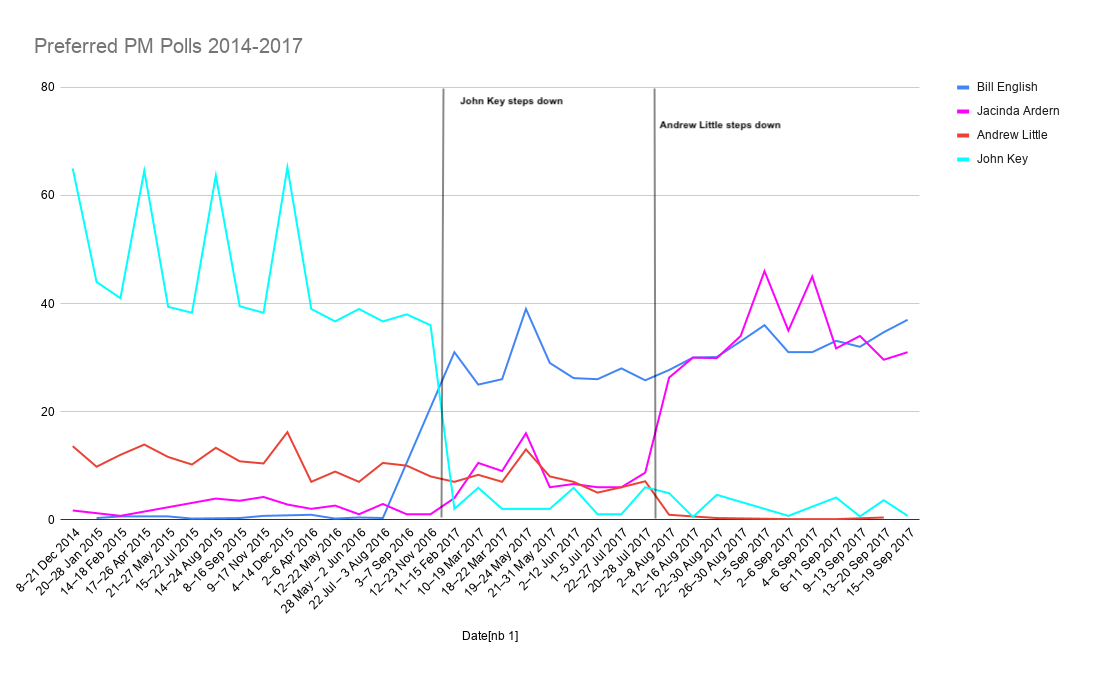There was an interesting discussion last week between the political tragics in and around Wellington. It was extremely wonkish and about political polling: in particular, the polling around leadership.
A comment was made about Andrew Little‘s leadership and the point at which it became terminal. This chart shows all public polls between the election of 2014 and the election in 2017.

As you can see John Key was stratospheric in the polls, scoring considerably higher than Andrew Little. However, there was a clear trend downwards and after April 2016, he trended downwards and no longer had high popularity peaks. His polling was still way above any current politician and it hasn’t been challenged since.
Bill English was lacklustre in comparison as he sleep-walked to losing. He briefly matched Key’s lowest point but he still had a consistent lead over Andrew Little. There was a slight upward trend and, just before the election in 2017, he managed even to beat Jacinda Ardern. One can only imagine what may have happened if the election campaign had gone on for a few more weeks. English, though, never really assailed the heights of John Key.
Andrew Little, the replacement for the disastrous David Cunliffe, barely reached Cunliffe’s own ratings and slid away slowly but surely. His trend line was distinctly downwards and he consistently polled far less than David Cunliffe ever had. Ironically, Cunliffe had replaced David Shearer as leader precisely because of poor poll ratings. There is an interesting point at which it became apparent that Andrew Little was a dead man walking and that was May 2017, the election year. His numbers dropped off a cliff and never recovered.
Jacinda Ardern’s stellar rise also drove the Labour party higher at the expense of all other parties and it was her leadership that enabled Labour to be in a position to form a government. Without her, they had no chance. Though her campaign was vapid and nothing more than an Obama-esque slogan-fest she still had far more personality than Bill English who tried and failed to be the new John Key.
Which brings us to an interesting comparison between Simon Bridges and Andrew Little, but for good measure let’s also look at Bridges’ numbers compared to David Shearer and David Cunliffe as well. The comparison is not good. He has consistently scored lower than all of the Labour leaders mentioned. He has barely challenged Shearer’s lowest score, nor even Cunliffe’s. They averaged far higher than Bridges does. Even Andrew Little, with his boring personality, scored higher than Simon Bridges.
That leads me on to wonder whether or not Simon Bridges is about to fall off a cliff as Andrew Little did?
It is inconceivable that National can win with a leader scoring less than Andrew Little, David Cunliffe or David Shearer. This is clear to anyone who cares to look; but, for some reason, National’s caucus seems blind to the obvious. Ardern was close to English. Key was higher than Clark. Clark was higher than Shipley. Simon Bridges isn’t even close to Jacinda Ardern — and that is a key requirement in order to be able to form a government.

Even Blind Freddy can see that National is polling high despite Bridges’ leadership rather than because of it. We will have to wait and see if Bridges, like Little, does fall off a cliff, but right now he polls behind all previous Labour leaders. He is going to have to have a Lazarus-like resurrection to even get close and there are precious few months to do so.
Blinkered toadying from National supporters cannot change what the numbers clearly show: that Simon Bridges is worse than David Shearer, David Cunliffe and Andrew Little. For sure he’s no John Key and he is not even a shadow of Bill English, and that is saying something.
One thing is for certain: as their party vote numbers slip away, you will be guaranteed that there will be a smaller caucus come the end of September. National is slated to pick up three or four new seats as a result of boundary changes: Dunedin South, Flat Bush, New Lynn and Port Hills. That will mean three or four fewer list places and that also means a loss of diversity as National’s list is the only place they can make that sort of a difference.
Something is going to have to change and change soon, otherwise they will just slip away.

